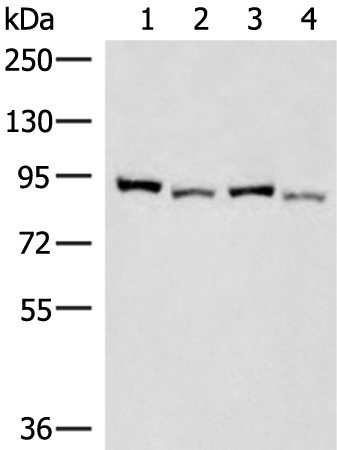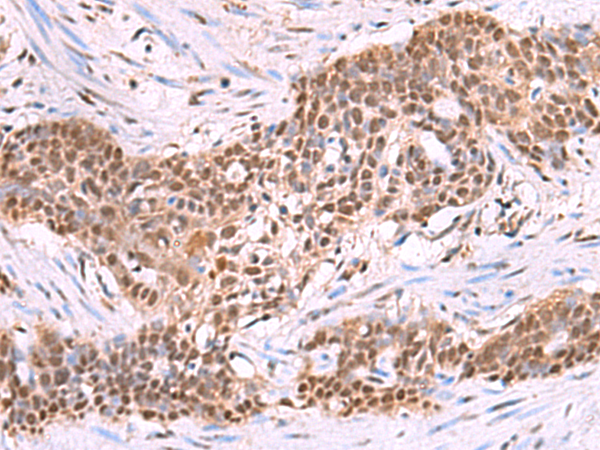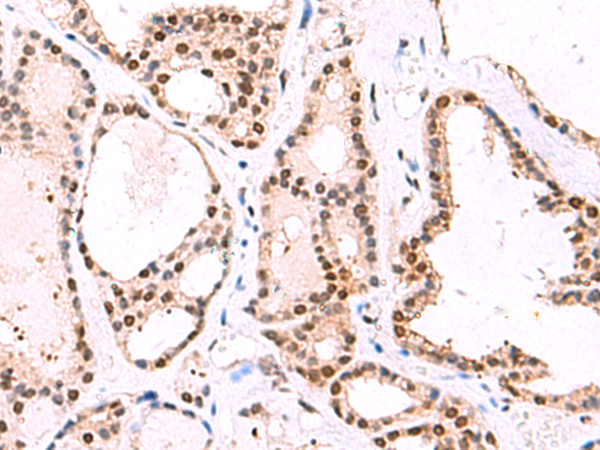


| WB | 咨询技术 | Human,Mouse,Rat |
| IF | 咨询技术 | Human,Mouse,Rat |
| IHC | 1/40-1/200 | Human,Mouse,Rat |
| ICC | 技术咨询 | Human,Mouse,Rat |
| FCM | 咨询技术 | Human,Mouse,Rat |
| Elisa | 1/5000-1/10000 | Human,Mouse,Rat |
| WB Predicted band size | 88 kDa |
| Host/Isotype | Rabbit IgG |
| Antibody Type | Primary antibody |
| Storage | Store at 4°C short term. Aliquot and store at -20°C long term. Avoid freeze/thaw cycles. |
| Species Reactivity | Human, Mouse |
| Immunogen | Synthetic peptide of human CUL4A |
| Formulation | Purified antibody in PBS with 0.05% sodium azide and 50% glycerol. |
+ +
以下是关于CUL4A抗体的3篇参考文献及其摘要概括:
---
1. **文献名称**: *CUL4A ubiquitin ligase is a key regulator of cell cycle progression and genome stability*
**作者**: Jackson S, Xiong Y
**摘要**: 本研究揭示了CUL4A作为CRL4泛素连接酶复合体的核心组分,通过调控细胞周期蛋白降解和DNA损伤修复通路维持基因组稳定性。CUL4A抗体被用于检测其在细胞周期不同阶段的表达变化,证明其缺失会导致DNA复制应激和细胞周期停滞。
2. **文献名称**: *Overexpression of CUL4A promotes tumorigenesis in hepatocellular carcinoma by targeting p53 for degradation*
**作者**: Lee J, Zhou P
**摘要**: 研究显示,CUL4A在肝癌中高表达,通过泛素化降解肿瘤抑制蛋白p53促进肿瘤进展。利用CUL4A抗体进行免疫组化分析,发现其表达水平与患者预后不良显著相关,提示其作为潜在治疗靶点的价值。
3. **文献名称**: *CRL4DDB1–CUL4A ubiquitin ligase complex regulates cellular responses to UV-induced DNA damage*
**作者**: Higa LA, Zhang H
**摘要**: 该研究通过免疫共沉淀(Co-IP)结合CUL4A抗体,证实CRL4复合体在紫外线诱导的DNA损伤应答中招募DDB1蛋白,介导损伤位点的修复蛋白泛素化修饰,从而保护细胞免受光损伤影响。
---
这些文献分别从细胞周期调控、癌症机制及DNA修复角度探讨CUL4A的功能,并展示了CUL4A抗体在基础研究与临床分析中的应用。
The CUL4A antibody is a research tool targeting Cullin 4A (CUL4A), a core component of the Cullin-RING E3 ubiquitin ligase complex (CRL4). CUL4A functions as a scaffold protein, assembling with adaptors like DDB1. substrate receptors (e.g., DCAFs), and the RING protein ROC1/RBX1 to mediate substrate-specific ubiquitination. This post-translational modification typically marks proteins for proteasomal degradation or functional modulation. CUL4A plays critical roles in DNA damage repair, cell cycle regulation, chromatin remodeling, and genomic stability by targeting substrates such as p21. p53. CDT1. and histone H2B. Dysregulation of CUL4A is implicated in cancers (e.g., hepatocellular carcinoma, breast cancer) and developmental disorders.
CUL4A antibodies are widely used in techniques like Western blotting, immunoprecipitation, and immunofluorescence to detect protein expression, localization, and interaction partners. They help elucidate CUL4A's involvement in disease mechanisms and its crosstalk with signaling pathways. Commercial CUL4A antibodies are typically validated for specificity against human CUL4A isoforms, though cross-reactivity with CUL4B (a paralog sharing ~80% homology) must be considered. Research using these antibodies has revealed CUL4A's oncogenic potential through overexpression in tumors and its role in chemoresistance, making it a potential therapeutic target. Proper validation via knockout/knockdown controls is essential to ensure antibody reliability in experimental settings.
×